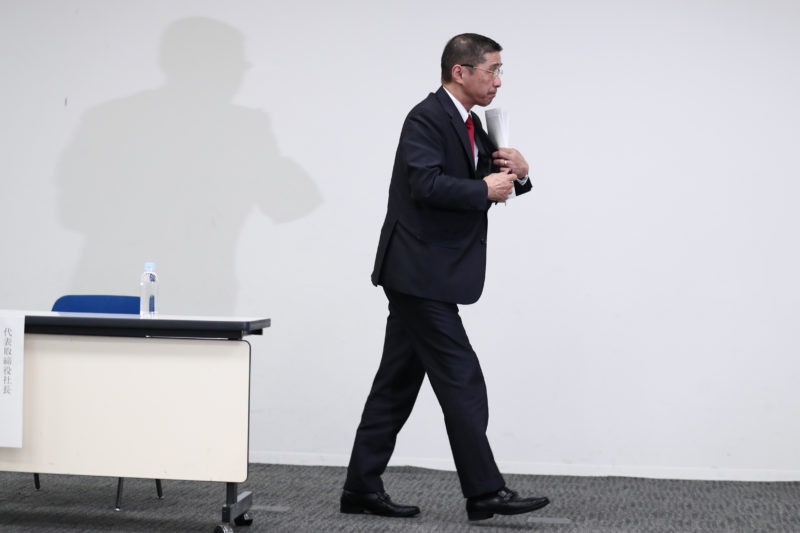Nissan seeks clean slate with CEO exit, but challenges remain
Saikawa exits stage left (Behrouz MEHRI)
Tokyo (AFP) – Crisis-hit Japanese automaker Nissan hopes the resignation of its embattled chief executive will help turn the page on the tumult unleashed by the arrest of former chief Carlos Ghosn.
But the firm still faces plenty of challenges, from naming a successor to Hiroto Saikawa and repairing its alliance with partner Renault, to turning around the firm’s finances after a disastrous year.
– The succession headache –
Nissan CEO Saikawa announced Monday he would be stepping down, after an internal audit launched in the wake of the Ghosn scandal found he benefitted inappropriately from a bonus scheme.
The firm’s current chief operating officer Yasuhiro Yamauchi will serve as interim CEO while Nissan searches for a permanent replacement. They hope to name someone by the end of October.
Masakazu Toyoda, head of the firm’s nomination committee, said they were looking for someone who could inspire employees at Nissan, which has been buffeted by scandal since Ghosn’s shock arrest in November.
The firm also wants a candidate with auto industry experience and a “deep understanding” of alliances, a necessary trait for a CEO who will have to navigate Nissan’s tricky relationship with French partner Renault.
Nissan says it has narrowed the field to 10 candidates, among them non-Japanese citizens and — unusually for Japan’s male boardrooms — women, but it is believed to favour hiring a Japanese citizen.
“There’s not an obvious replacement,” a source with knowledge of the matter told AFP.
Yamauchi, 63, is not considered the “new blood” the firm needs and is not believed to be keen on keeping the post.
– House-cleaning –
Saikawa described his resignation as the result in part of the “milestone” of completing the firm’s internal audit.
The audit’s conclusions focus largely on Ghosn and his former right-hand man Greg Kelly, accusing them of costing the firm at least 35 billion yen ($326 million) — a figure that includes deferred payments that were never actually made.
Ghosn denies any wrongdoing and a statement from his lawyers Monday accused Nissan of an “inconsistent, contradictory and incoherent” position.
In addition to Ghosn, Kelly and Saikawa, six other senior Nissan officials — some still working at the firm — were found to have improperly received bonuses. Their names have not been made public.
Nissan says the scheme that Saikawa and the other unnamed officials participated in was not illegal, and that the issue is different from what it calls intentional misconduct by Ghosn and Kelly.
And it says Saikawa and the other executives will return the money involved.
It is unclear whether the audit would continue, with sources saying some board members want further investigation.
A source told AFP that the American lawyer who led the probe, Christina Murray, opted to resign in frustration that the audit’s conclusions focused only on directors at the firm.
– Alliances to rebuild –
The next CEO of Nissan faces the unenviable task of returning the firm to financial health after it reported its worst first-quarter results since the global financial crisis.
The automaker has cited a global slowdown in the auto sector, but it is also suffering from a lack of innovation on its production line and reputational damage from the Ghosn scandal.
Whoever succeeds Saikawa will inherit the harsh cost-cutting measures he proposed as a way out of the wilderness, including reducing dealer incentives and promotions but also cutting global production by 10 percent to 2023, a measure that means the loss of 12,500 jobs.
Then there is the unresolved business of Nissan’s fractious alliance with Mitsubishi Motors and Renault.
Ghosn, who created the alliance, wanted greater integration with France’s Renault, and says his push for that prompted angry Nissan executives to “plot” against him.
The two firms have made a show of holding the marriage together in the wake of Ghosn’s arrest, but tensions have bubbled to the surface over the alliance’s future.
Renault holds a 43-percent stake in the Japanese automaker, which in turn controls 15 percent of the French firm but has no voting rights.
Sources say various changes to that structure have been proposed, but “nothing is official” yet.
Disclaimer: Validity of the above story is for 7 Days from original date of publishing. Source: AFP.


